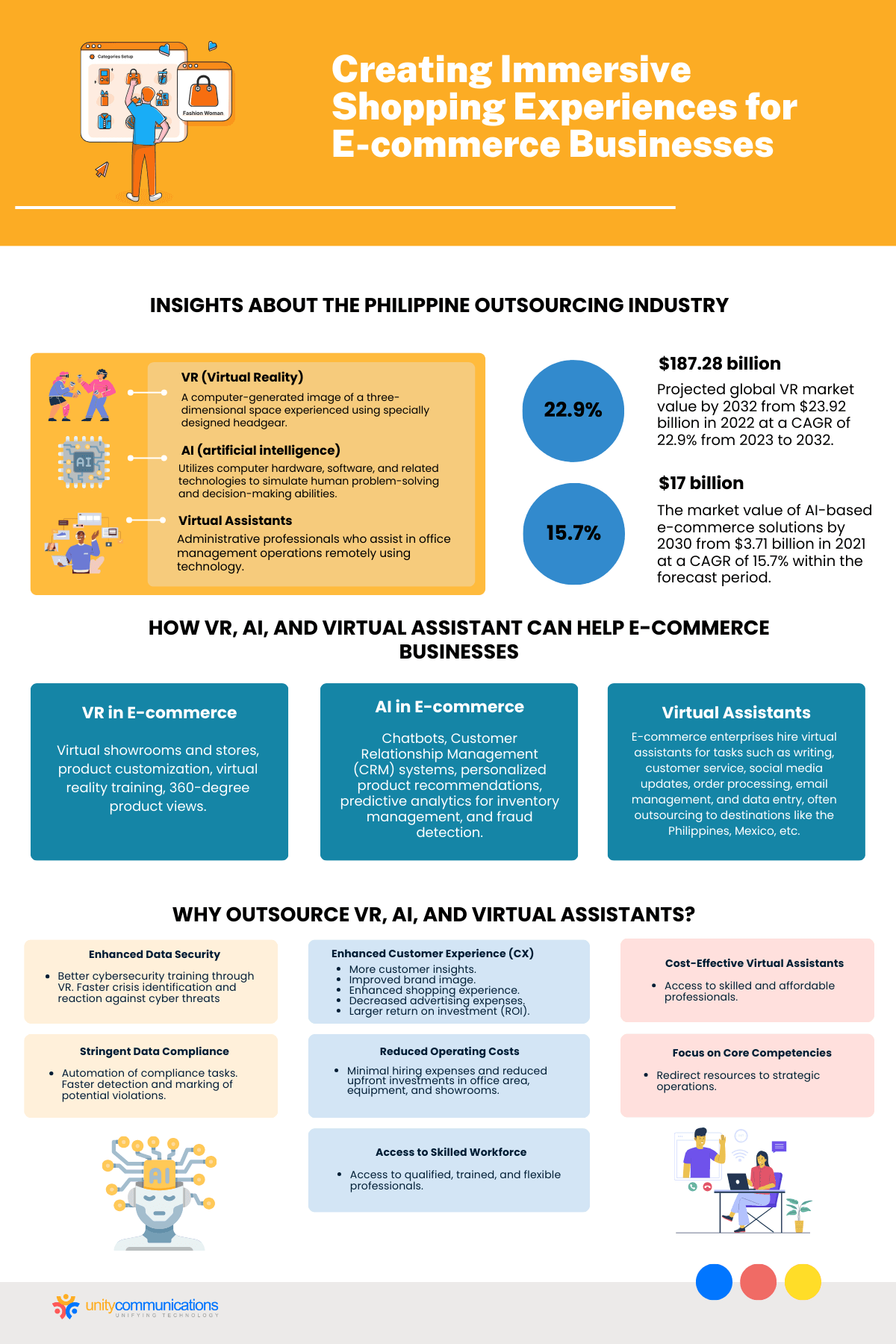Table of Contents
Learn more about outsourcing services for Phoenix businesses. Watch the video below.
Are you planning to upgrade your services by using the latest technologies, such as virtual reality (VR) and artificial intelligence (AI), and hiring virtual assistants for your Phoenix e-commerce business?
If yes, do it right with the help of an outsourcing company.
This blog explains the benefits of leveraging VR, AI, and virtual assistants through e-commerce outsourcing. It also discusses the strategy’s potential drawbacks and helpful tips for finding the ideal third-party provider.
Keep reading!
What VR, AI, and Virtual Assistants Mean for E-commerce

Before diving deeper, let us take a quick look at what VR, AI, and virtual assistants are for the e-commerce industry and their prospects in the years ahead:
- VR is a computer-generated image of a three-dimensional space that users can experience using specially designed headgear. Some use cases of VR in e-commerce include virtual showrooms and stores, product customization, virtual reality training, and 360-degree product views.
- AI uses computer hardware, software, and other related technologies to simulate the human mind’s ability to solve problems and make decisions. Examples of AI in e-commerce are chatbots and customer relationship management (CRM) systems.
- Virtual assistants are administrative professionals who work for a BPO provider. These third-party workers assist in office management operations but can also handle tasks such as writing, customer service, marketing, social media updates, and editing. They work remotely with technology to finish tasks.
AI drives VR. E-commerce enterprises of all sizes and industries increasingly use these technologies to improve customer service and sales, whether in-house or through third-party providers from the Philippines, Mexico, and other outsourcing destinations.
According to Precedence Research, the global VR market value will likely reach $187.28 billion by 2032, up from $23.92 billion in 2022. The market will register a compound annual growth rate (CAGR) of 22.9% from 2023 to 2032.
Similarly, the AI-based e-commerce solutions market is expected to grow to almost $17 billion in 2030 from $3.71 billion in 2021, recording a 15.7% CAGR within the forecast period.
Benefits of Outsourcing VR, AI, and Virtual Assistants for E-commerce

Discover the benefits of outsourcing VR to AI and virtual assistants for e-commerce. Learn why delegating e-commerce functions can be more favorable than performing them in-house.
Greater Customer Experience (CX) for Increased Satisfaction
Partnering with a BPO provider to operate VR, AI, and virtual assistants ensures first-rate e-commerce customer service delivery. Businesses regularly achieve better CX with e-commerce customer service outsourcing because third-party agents can acquire more customers and strengthen brand loyalty.
Look at the benefits of improved CX:
- More customer insights. AI, VR, and similar customer support systems can collect and analyze more data. They can provide expanded information on customer preferences and actions. Third-party professionals analyze this information to improve their CX techniques.
- Better brand image. A strong reputation contributes to a larger customer base. Skilled third-party VAs with customer service duties and advanced technologies can lead to superior CX, generating more loyal buyers and a bigger market share.
- Enhanced shopping experience. VR with AI and virtual assistants for e-commerce helps provide more exact product information, leading to assured purchasing choices and improved sales. Virtual assistants can help serve customers better, strengthening product or service loyalty.
- Decreased advertising expenses. Higher CX improves revenue while reducing acquisition costs. A strong customer base means you can lower your marketing and advertising budget and use the funds for other activities.
- Larger return on investment (ROI). These features enhance CX, consequently boosting ROI. Satisfied customers return to your online store to buy more products. They are also likely to promote your products or services to others via word of mouth or online.
Diminished Running Costs to Release More Funds
One advantage of subcontracting technologies and virtual assistants to a business process outsourcing (BPO) company over developing these capabilities in-house is decreased operating expenses. Building and running in-house customer support with these high-tech tools costs considerable capital.
Discover the cost reductions when allowing a third-party team to handle AI-backed customer service operations:
- Hiring. Partnering with a service provider means minimal hiring expenses. The third-party provider deals with extensive and costly recruitment activities. It manages job advertisements, application screening, examinations, onboarding, and training.
- Remunerations. Another outsourcing perk is saving on payroll and employee-related compensation. The BPO provider also pays for non-monetary staff benefits, such as holiday and sick leave and medical insurance.
- Upskilling. The service provider spends on staff re-training and skill enhancement to sharpen the virtual assistants’ and other third-party professionals’ capabilities. They must stay updated on the latest technological developments, industry practices, and workflow techniques. Training in-house staff requires a larger budget.
- Office area, equipment, and showrooms. One reason to outsource VR with AI and virtual assistants for e-commerce is reduced upfront investments. Thanks to these advanced tools, you no longer need physical showrooms for product or service demonstrations. Plus, the BPO provider uses its own infrastructure and resources.
- Refunds. The number of exchanges and returns will likely reduce since customers can see your products virtually. Lower refunds translate to decreased inventory and logistics expenses.
Undivided Focus on Core Competencies to Gain Strategic Advantage
Outsourcing VR with AI and virtual assistants for e-commerce enables your organization to concentrate on what you do best—profit-making.
Delegating functions lets you and your team redirect valuable company and personnel resources to more urgent, high-value, or strategic operations. You can focus on product or service innovation, market expansion, or marketing.
The BPO partner can also effectively use VR, AI, and other first-rate technologies in your e-commerce operations. It helps your organization be well-positioned to address customers’ needs and adjust to the evolving market landscape. It can also build and strengthen your competitive advantage.
Gaining a competitive advantage leads to increased earnings. With more money, you can:
- Refine or update product and service quality to attract buyers and boost transactions.
- Broaden market access faster to diversify revenue sources and reduce dependency on the current customer base.
- Invest more in cutting-edge technology to further streamline procedures and enhance output.
- Put more resources into employee development and training to maximize performance and production.
- Motivate all staff members, including third-party professionals, with extra bonuses and benefits to promote optimism and prevent resignations.
- Optimize consumer service for greater customer fulfillment and brand loyalty.
Knowledgeable and Competent Teams to Provide Efficient Services
Another reason to let a service provider handle VR, AI, and virtual assistants for e-commerce is its skilled workforce. For instance, when collaborating with an offshoring provider in the Philippines, you can access a labor force of qualified, active, flexible, and college-trained individuals.
These professionals can work anytime, irrespective of time zone differences, to manage the daily activities of your online store. They consist of specialists and experts with in-demand technical capabilities and soft skills. Working based on Western job procedures and workplace standards is a minor issue for them.
Virtual assistants and outsourced professionals can use VR with AI to provide more precise and effective e-commerce customer service. Their hard skills and interpersonal talent, combined with the ability to see and interact with the products in a virtual environment, can take customer satisfaction to a higher level, leading to more sales.
With first-class customer service and immersive online shopping features, your e-commerce business can achieve these benefits:
- More customer retention
- Stronger company and brand reputation
- Higher product upselling and cross-selling
- Better employee work satisfaction and morale
- Longer market competitiveness
Enhanced Data Security to Protect Company and Customer Data
To deliver customer-centric outsourcing, established BPO companies prioritize data security and protection when utilizing AI and virtual assistants for e-commerce. They maintain adequate safeguards to secure confidential information and ensure compliance with data privacy requirements.
As time passes, intruders and hackers develop inventive methods to break the most sophisticated security systems and exploit, expose, or steal critical data. Due to a lack of appropriate equipment, time, and skill, many organizations need help defending against online intrusions.
By outsourcing e-commerce services, businesses can leverage VR, AI, virtual assistants, and other advanced technologies to fight and mitigate cybersecurity threats and attacks.
Below are the advantages of using AI-based technologies to thwart data breaches:
- Better cybersecurity training. VR-based training sessions allow employees and third-party professionals to experience cyber threats with VR headsets. This immersive technology makes simulated exercises more realistic, teaching workers how to better contain and resolve risks.
- Strengthened precision and effectiveness. AI-powered systems can monitor and analyze more digital networks and devices than conventional security solutions. They can discover trends and sequences that traditional data security approaches can miss, resulting in better threat recognition.
- Faster crisis identification and reaction. AI-driven systems can navigate across massive volumes of data faster than regular cybersecurity solutions to spot suspicious and harmful activities, including zero-day attacks. Leveraging AI and virtual assistants for e-commerce via outsourcing can fortify data security.
Stringent Data Compliance to Skip Heavy Sanctions
Acquiring AI-powered systems and virtual assistants through e-commerce outsourcing ensures the proper use of these tools to enhance your business’s compliance.
The third-party provider helps your organization meet government laws and industry standards. These regulations include the Payment Card Industry Data Security Standard (PCI DSS), the Health Insurance Portability and Accountability Act of 1996 (HIPAA), and the General Data Protection Regulation (GDPR).
Non-compliance might involve your company in lawsuits, penalties, adverse media coverage, and other regulatory and financial consequences.
Here is how AI and virtual assistants for e-commerce can bolster your compliance efforts:
- Automate tasks. AI can streamline operations, including document inspection and data examination. This ability reduces the burden on compliance staff or specialists while enhancing the pace and reliability of compliance procedures.
- Detect and mark potential violations. AI-fueled platforms can scan massive volumes of data to find irregularities or abnormalities that can signal a possible regulatory breach.
- Monitor compliance processes: These high-tech applications can instantaneously monitor your company’s operations and transactions, discovering compliance concerns.
- Improve risk management. By analyzing vast amounts of information and delivering insights into possible compliance concerns, AI-based systems can aid compliance specialists in discovering, evaluating, managing, and eliminating threats.
- Advance compliance education. One benefit of leveraging VR with AI and virtual assistants for e-commerce is that these technologies are customizable. They can generate and offer compliance training specific to the requirements of your employees and the organization. These ensure ample training in compliance matters.
Cost-Effective, Efficient Virtual Assistants for Greater Returns
One reason to subcontract AI with virtual assistants for e-commerce is that providers in the Philippines, Mexico, and other outsourcing destinations outside the U.S. offer accessible, skilled, and affordable AI professionals.
These individuals are willing to work remotely and have adequate educational training, communication skills, and technical accreditations to perform AI-based outsourcing services.
Here are the average hourly salaries of virtual assistants in the Philippines and Mexico compared to Phoenix, Arizona.
| Country | Hourly Rate Range (in U.S. Dollars) | Average Hourly Rate |
|---|---|---|
| Philippines | $5 – $50 | $27.5 |
| Mexico | $5 – $35 | $20 |
| Phoenix, Arizona (U.S.) | $15 – $50 | $32.5 |
Source: Upwork
Note: For a simple representation, the average salary for each country is calculated by adding the small and large amounts, and then dividing the sum by two. For instance, the hourly rate for VAs in the Philippines ranges between $5 and $35. Therefore, $27.5 is the result of dividing $55 ($5 +$50) by two.
Based on the figures above, a VA in Mexico makes an average salary of $20 per hour. In Phoenix (Arizona), VAs charge $32.5. You save $12.5 ($32.5 less $20) hourly by assigning Mexican VAs to manage your Phoenix e-commerce operations. To obtain accurate costs and other information, contact a BPO provider.
Potential Drawbacks with Outsourcing

Outsourcing VR with AI and virtual assistants for e-commerce can generate potential issues. The two most prevalent disadvantages are as follows:
1. Rising Cybersecurity Threats
While AI can help strengthen data security and protection, the dangers of cyber-attacks and online intrusions continue to grow and advance. Assigning operations to a non-affiliate organization, such as a BPO provider, means sharing your confidential client, end-user, and company information.
Some information at risk includes usernames, insurance details, passwords, home addresses, credit card accounts, bank account numbers, and credit card accounts. Critical files that are not safeguarded or validated can result in data breaches and financial loss.
Before outsourcing VR with AI and virtual assistants for e-commerce, ensure your potential BPO partner has robust security protocols and relevant technologies to reduce cyber intrusion incidents. Sign a formal non-disclosure agreement (NDA) stating the third-party vendor will provide heightened data protection and strict data access policies.
2. Losing Administrative Control
Using BPO services to run VR with AI and virtual assistants for e-commerce involves losing a certain level of management control over the outsourced operations.
The service provider often uses deep-rooted outsourcing best practices to increase production, optimize operations, and improve productivity. When this occurs, rely on the third-party vendor to satisfy your requirements and outsourcing targets.
It might be disruptive for third-party professionals to apply your internal policies to outsourced tasks when these policies are unfamiliar. The better option might be permitting the BPO provider to manage the assigned processes with its tried-and-tested methods and techniques to maximize outsourcing benefits.
Whatever the case, discuss how to handle operations and technologies with your service provider. Your business partner will not only provide you with outsourced customer service tips, but it will also be willing to negotiate an acceptable arrangement.
How to Get the Right Outsourcing Partner
The BPO industry is vast, consisting of numerous third-party providers. Follow these steps to find the right BPO company to supervise VR, AI, and virtual assistant functions for your Phoenix e-commerce business:
- State outsourcing objectives and needs. Engage with other decision-makers regarding outsourcing plans. Assess the proper number of third-party workers, communication forms, and the method of outsourcing that best meets your goals and desired outcomes.
- Identify and evaluate potential service providers. Investigate every BPO company that meets your requirements. Check their capabilities, competence, successes, and history. Choose those that offer specialized teams focused solely on your outsourced assignments.
- Obtain detailed information about outsourcing charges. Ask each prospect about its full costs, rates, and other billings. Fees for running VR with AI and virtual assistants for e-commerce functions vary based on the prospect’s track record and your needs.
- Develop a request for proposal (RFP). Reduce the number of applicants. You should have obtained all of the necessary information at this stage. Prepare an RFP and distribute it to each candidate on your shortened list. The job scope, time range, budget, and needed solutions for given tasks must all be outlined in the document.
- Pick the BPO partner that can offer the most benefits. Draft a service-level agreement (SLA) with your chosen BPO provider. The SLA specifies the services to be delivered and other essential targets, such as key performance indicators (KPIs), that must be met.
- Monitor the outsourced work. Check that the engagement meets every objective according to the timeline. Maintain constant contact with your BPO partner to increase the chance of success when outsourcing VR with AI and virtual assistants for e-commerce.
The Bottom Line

With offshore or nearshore outsourcing, you can leverage VR, AI, and virtual assistants to create immersive shopping experiences for your Phoenix e-commerce business. These strategies are excellent options for increasing customer support activities in your online shop to increase revenue at lower operating costs.
Potential risks might arise when outsourcing operations, but they can be mitigated through careful analysis and preparation. BPO providers will assist you in your outsourcing success.
Let’s connect if you want to learn more about using BPO services to boost your e-commerce business in Phoenix!




